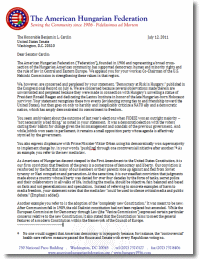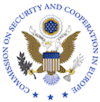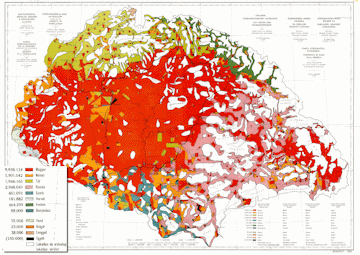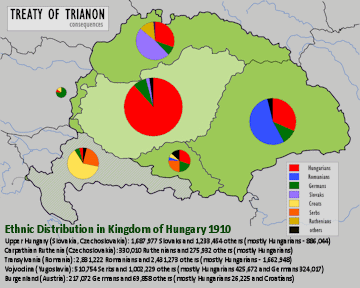 1/11/2013 - AHF again responds to Senator Ben Cardin, Co-Chair of the US Helsinki Commission. In his December 20, 2012 statement, the Senator was once again unfairly critical of Hungary. "We write in connection with your December 20 statement not because we believe that no steps can be taken to strengthen democracy in Hungary (such as permitting members of parliamentary caucuses to vote their conscience without being fined). Rather we believe that in order to be credible, criticism must be based on the complete record...As the Helsinki Commission’s public utterances carry great moral authority, we are concerned that (1) your assertions concerning Hungary omit relevant facts; and (2) your statement fails to raise the discrimination and intolerant policies toward ethnic Hungarians in some of the countries bordering Hungary. The statement therefore leaves the impression, unintended and unjustified as it may be, of bias, which could result in cynicism toward the Helsinki Commission and its valuable and necessary work." 1/11/2013 - AHF again responds to Senator Ben Cardin, Co-Chair of the US Helsinki Commission. In his December 20, 2012 statement, the Senator was once again unfairly critical of Hungary. "We write in connection with your December 20 statement not because we believe that no steps can be taken to strengthen democracy in Hungary (such as permitting members of parliamentary caucuses to vote their conscience without being fined). Rather we believe that in order to be credible, criticism must be based on the complete record...As the Helsinki Commission’s public utterances carry great moral authority, we are concerned that (1) your assertions concerning Hungary omit relevant facts; and (2) your statement fails to raise the discrimination and intolerant policies toward ethnic Hungarians in some of the countries bordering Hungary. The statement therefore leaves the impression, unintended and unjustified as it may be, of bias, which could result in cynicism toward the Helsinki Commission and its valuable and necessary work."
 |
[ Download] the AHF Letter to Senator Cardin |
AHF's full statement appears below. The Senator's statement appears below it. Included in the letter, were links to AHF's earlier summary of current issues related to the Hungarian minority Rumania.
The letter in full text appears below or [download]:
January 10, 2013
Honorable Benjamin L. Cardin
Co-Chairman, U.S. Helsinki Commission
Washington, D.C. 20510
Dear Mr. Chairman:
The American Hungarian Federation (“AHF”), founded in 1906 and representing a broad cross-section of the Hungarian American community, supports democracy in Central and Eastern Europe. It also supports the U.S. Helsinki Commission’s mission of monitoring compliance with the Helsinki Accords and promoting human rights and democracy. We write in connection with your December 20 statement not because we believe that no steps can be taken to strengthen democracy in Hungary (such as permitting members of parliamentary caucuses to vote their conscience without being fined). Rather we believe that in order to be credible, criticism must be based on the complete record.
As the Helsinki Commission’s public utterances carry great moral authority, we are concerned that (1) your assertions concerning Hungary omit relevant facts; and (2) your statement fails to raise the discrimination and intolerant policies toward ethnic Hungarians in some of the countries bordering Hungary. The statement therefore leaves the impression, unintended and unjustified as it may be, of bias, which could result in cynicism toward the Helsinki Commission and its valuable and necessary work.
Concerning Hungary, the only country named in the statement, you conclude that the government’s response to certain appalling anti-Semitic phenomena, such as far right politician Marton Gyongyosi urging the government to draw up lists of Jews who pose a "national security risk," is wanting, “to say the least.” Do the following facts justify a modified conclusion: the government’s immediate condemnation of Gongyosi’s statement; or the demonstration protesting against Gyongyosi at which Fidesz parliamentary group leader Antal Rogan also spoke; or the legislation initiated by Fidesz in response to Gyongyosi’s outrageous statement that would allow for the sanctioning of MPs for using incendiary language; or both conservatives and liberals here (including this writer) and in Hungary jointly raising their voice in protest, which sent a loud message that anti-Semitism will not be tolerated; or the government establishing a Hungarian Holocaust Commission; or its raising pensions for the more than 8,000 Holocaust survivors?
And while your statement is silent about discriminatory and anti-Hungarian measures in some of the states neighboring Hungary, it criticizes Budapest for taking legitimate and democratic steps, such as extending citizenship, to protect Hungarian minorities. We urge you to “follow the trends” not only in Hungary, but also in the region and to publicly speak out against anti-Hungarian phenomena, many of which are official acts. Some of the most troubling measures are set forth in our December 1, 2011 and August 20, 2012 letters to you: [Slovakia_Cardin-Smith_2011-12-01.pdf] and [AHF_Statement_Miko_Helsinki.pdf]
These countries should be encouraged to build tolerant societies by respecting the rights of their Hungarian minorities. Ronald S. Lauder, President of the World Jewish Congress, aptly noted, "one of the basic tenets of liberal democracy is that minority rights are protected.” And as Congressman Tom Lantos eloquently reminded us, this protection should extend to all religious, national and ethnic groups, including Hungarians.
Sincerely,
Frank Koszorus, Jr.
National President
Public Member of the U.S. Delegation of the 1989 Conference on
Security and Cooperation in Europe on the Human Dimension
-----
Statement of Senator Benjamin Cardin on the floor of the Senate, December 20, 2012
Mr. CARDIN. Mr. President, as the Senate chair of the Helsinki Commission, I have a longstanding interest in Central Europe. For many years the Helsinki Commission was one of the loudest and clearest voices to speak on behalf of those oppressed by communism and to call for democracy, human rights, and freedom from Soviet oppression. It has been a great triumph and joy to see the peoples of this region free from dictatorship.
Over the past two decades I have been profoundly heartened as newly freed countries of Central Europe have joined the United States and NATO and have become our partners in advocating for human rights and democracy around the globe. Leadership on those issues may be especially important now as some countries in the Middle East undertake transition, the outcome of which is far from certain. Even in Europe, in the western Balkans, there is a crying need for exemplary leadership, not backsliding.
Americans know from our own history that maintaining democracy and promoting human rights are never jobs that are finished. As my friend and former colleague Tom Lantos said, “The veneer of civilization is paper thin. We are its guardians, and we can never rest.”
For some time I have been concerned about the trajectory of developments in Hungary, where the scope and nature of systemic changes introduced after April 2010 have been the focus of considerable international attention.
At the end of November, Hungary was back in the headlines when Marton Gyongyosi, a member of the notorious extremist party Jobbik and also vice chairman of the Parliament’s Foreign Affairs Committee, suggested that Hungarian Jews are a threat to Hungary’s national security and those in government and Parliament should be registered. The ink was barely dry on letters protesting those comments when another Hungarian member of Parliament, Balazs Lenhardt, participated in a public demonstration last week where he burned an Israeli flag.
The fact is that these are only the latest extremist scandals to erupt in Budapest over the course of this year. In April, for example, just before Passover, a Jobbik MP gave a speech in Parliament weaving together subtle anti-Roma propaganda with overt anti-Semitism blood libel. After that, Jobbik was in the news when it was reported that one of its members in Parliament had requested and received certification from a DNA testing company that his or her blood was free of Jewish or Romani ancestry.
At issue in the face of these anti-Semitic and racist phenomena is the sufficiency of the Hungarian Government’s response and its role in ensuring respect for human rights and the rule of law. And the government’s response has been, to say the least, wanting.
First, it has been a hallmark of this government to focus on blood identity through the extension of Hungarian citizenship on a purely ethnic basis. The same Hungarian officials have played fast and loose with questions relating to its wartime responsibilities, prompting the U.S. Holocaust Memorial Museum to issue a public statement of concern regarding the rehabilitation of fascist ideologues and political leaders from World War II.
I am perhaps most alarmed by the government’s failure to stand against the organized threats from Jobbik. For example, in late August a mob estimated at 1,000 people terrorized a Roma neighborhood in Devecser, taunting the Romani families to come out and face the crowd. There were reportedly three members of Parliament from the Jobbik party participating in that mob, and some people were filmed throwing bricks or stones at the Romani homes. The failure to investigate, let alone condemn such acts of intimidation, makes Prime Minister Orban’s recent pledge to protect “his compatriots” ring hollow.
Of course, all this takes place in the context of fundamental questions about democracy itself in Hungary.
What are we to make of democracy in Hungary when more than 360 religious organizations are stripped of their registration overnight and when all faiths must now depend on the politicized decision-making of the Parliament to receive the rights that come with registration?
What are we to make of the fact that even after the European Commission and Hungary’s own Constitutional Court have ruled against the mass dismissal of judges in Hungary’s court-packing scheme, there is still no remedy for any of the dismissed judges?
What is the status of media freedom in Hungary, let alone the fight against anti-Semitism, if a journalist who writes about anti-Semitism faces possible sanction before the courts for doing so?
What are we to make of Hungary’s new election framework, which includes many troubling provisions, including a prohibition on campaign ads on commercial radio and TV, onerous new voter registration provisions, and limits on local election committees, which oversee elections?
I find it hard to imagine that Jews, Roma, and other minorities will be safe if freedom of the media and religion, the rule of law, the independence of the Judiciary, and the checks and balances essential for democracy are not also safeguarded. With that in mind, I will continue to follow the overall trends in Hungary and the implications for the region as a whole.
Join online!

[< Go to all AHF news]
|
Related Articles

1/16/2013 - Az Amerikai Magyar Szövetség a Helsinki Bizottságnál tiltakozik: A legrégibb és legnagyobb amerikai magyar szervezet, az Amerikai Magyar Szövetség (AMSZ), amely mindig is támogatta a Helsinki Bizottságot az emberi jogokért, a demokráciáért vívott küzdelmében, levélben fordult Benjamin Cardin marylandi szenátorhoz, az amerikai Helsinki Bizottság elnökéhez. [tovább]
 7/13/2012 - AHF Reacts to Senator Benjamin L. Cardin (D-MD), Co-Chairman of the U.S. Helsinki Commission, who questioned democracy in Hungary and criticized expressions of concern for Hungarian minorities. AHF's letter expressed its steadfast conviction that judgments be "objective, fair, balanced and based on facts and not generalizations and speculation." It also urged the Helsinki Commission not to ignore the Hungarian minorities but to publicly and privately encourage Slovakia and Romania "to build tolerant societies by respecting the rights of their Hungarian and other minorities and the rule of law." [read more] 7/13/2012 - AHF Reacts to Senator Benjamin L. Cardin (D-MD), Co-Chairman of the U.S. Helsinki Commission, who questioned democracy in Hungary and criticized expressions of concern for Hungarian minorities. AHF's letter expressed its steadfast conviction that judgments be "objective, fair, balanced and based on facts and not generalizations and speculation." It also urged the Helsinki Commission not to ignore the Hungarian minorities but to publicly and privately encourage Slovakia and Romania "to build tolerant societies by respecting the rights of their Hungarian and other minorities and the rule of law." [read more]
 7/13/2011 - Levelet írt az egyik szenátornak az Amerikai Magyar Szövetség: Levélben fordult az Amerikai Magyar Szövetség (AHF) Benjamin Cardin demokrata párti amerikai szenátorhoz, aki a múlt héten a Kongresszusi Közlönyben Magyarországgal kapcsolatos nyilatkozatot tett közzé. [tovább magyarul] 7/13/2011 - Levelet írt az egyik szenátornak az Amerikai Magyar Szövetség: Levélben fordult az Amerikai Magyar Szövetség (AHF) Benjamin Cardin demokrata párti amerikai szenátorhoz, aki a múlt héten a Kongresszusi Közlönyben Magyarországgal kapcsolatos nyilatkozatot tett közzé. [tovább magyarul]
 9/27/2012 - Miért támadja Magyarországot az amerikai szenátor?: A legnagyobb amerikai-magyar szervezet levélben fordult Benjamin Cardin, marylandi szenátorhoz, hogy aggodalmát fejezze ki a törvényhozó szokatlanul éles hangvételű, július 6-i "Veszélyben a demokrácia Magyarországon" című közleménye miatt. 9/27/2012 - Miért támadja Magyarországot az amerikai szenátor?: A legnagyobb amerikai-magyar szervezet levélben fordult Benjamin Cardin, marylandi szenátorhoz, hogy aggodalmát fejezze ki a törvényhozó szokatlanul éles hangvételű, július 6-i "Veszélyben a demokrácia Magyarországon" című közleménye miatt.
[tovább magyarul]
 7/14/2011 - American-Hungarian Federation strikes back at US senator over critical comments, by MTI: 7/14/2011 - American-Hungarian Federation strikes back at US senator over critical comments, by MTI:
The American Hungarian Federation (AHF) voiced “concern and perplexity” in a letter to Democrat Senator Benjamin L Cardin over his recent remarks concerning Hungary. [read more]
Shortcuts
Why So Many Hungarians Across the Border?
One thousand years of nation building successfully delineated groups based on culture, religion, geography, and other attributes to create the countries with which we are so familiar. While some Western European nations would continue power struggles and princely battles and civil wars, Hungary, founded in 896, was a peaceful multi-ethnic state for a 1000 years and her borders were virtually unchanged. Until 1920...
The Treaty of Trianon in 1920... in the aftermath of WWI, was extremely harsh on Hungary and unjustifiably one-sided. The resulting "treaty" lost Hungary an unprecedented 2/3 of her territory, and 1/2 of her total population or 1/3 of her Hungarian-speaking population. Add to this the loss of up to 90% of vast natural resources, industry, railways, and other infrastructure. The clear winner of the land grab, was Rumania, who, established only 60 years earlier, more than doubled in size overnight.
Ethnic Distribution in the Kingdom of Hungary in 1910 (Hungarians shown in red)

[download extra large image 4962x3509]
[download large image 1000x707]
Hungarian populations declined significantly after forced removals such as the Benes Decrees and other pograms, the effects of WWI, and Trianon in 1920. With continued pressure and discriminative policies such as the 2009 Slovak Language Law, this trend continued over the past 90 years.

- In Upper Hungary (awarded to Slovakia, Czechoslovakia): 1,687,977 Slovaks and 1,233,454 others (mostly Hungarians - 886,044, Germans, Ruthenians and Roma) [according to the 1921 census, however, there were 1,941,942 Slovaks and 1,058,928 others]
- In Carpathian Ruthenia (awarded to Czechoslovakia): 330,010 Ruthenians and 275,932 others (mostly Hungarians, Germans, Romanians, and Slovaks)
- In Transylvania (awarded to Romania): 2,831,222 Romanians (53.8%) and 2,431,273 others (mostly Hungarians - 1,662,948 (31.6%) and Germans - 563,087 (10.7%)). The 1919 and 1920 Transylvanian censuses indicate a greater percentage of Romanians (57.1%/57.3%) and a smaller Hungarian minority (26.5%/25.5%)
- In Vojvodina 510,754 Serbs and 1,002,229 others (mostly Hungarians 425,672 and Germans 324,017)
- In Vojvodina and Croatia-Slavonia combined (awarded to Yugoslavia): 2,756,000 Croats and Serbs and 1,366,000 others (mostly Hungarians and Germans)
- In Burgenland (awarded to Austria): 217,072 Germans and 69,858 others (mainly Croatian and Hungarian)
[read more on the Treaty of Trianon]
AHF Statements on Trianon:
AHF Articles on Rumania:
 You will need the free Adobe Reader to open the following files. Click the image to download. You will need the free Adobe Reader to open the following files. Click the image to download.
Articles and Essays by AHF Members
- "NATO Enlargement" by Frank Koszorus Jr. March 29, 2004
Remarks on the Occasion of the Enlargement of NATO, Corcoran Gallery of Art, Washington, D.C. [download]
---
- "Nato Enlargement And Minority Rights: Prerequisites To Security" by Frank Koszorus, Jr., April 2003
A memorandum that was submitted to Robert A. Bradtke, Deputy Assistant Secretary for European and Eurasian Affairs, and Heather A. Conley, Deputy Assistant Secretary for European and Eurasian Affairs during a roundtable discussion on "NATO Enlargement and the Current State of the Trans-Atlantic Alliance." This submission follows several other intiatives, including submissions to Lord Roberston, Secretary General of NATO. [download]
---
- “Nato Enlargement: Promoting Western Values, Strengthening The Alliance” by Frank Koszorus, Jr., April 29, 2003
A Statement Before The United States Senate Committee On Foreign Relations.
[download]
---
- "U.S. Senate Unanimously Ratifies Nato Treaty; Senators Raise Rights Of Minorities: Federation Supports Efforts Aimed At Encouraging Romania And Slovakia To Respect Rights Of Hungarian Minorities And Restore Communal Properties" - Press Release by Zoltan Bagdy, May 9, 2003 [download]
Congressional Resolutions and Records
- H.RES 191 - A RESOLUTION urging the "prompt and fair restitution of church properties by Romania and Slovakia - TOM LANTOS / TOM TANCREDO (April 6th 2005) in the House of Representatives [download]
- A RESOLUTION REGARDING THE ISSUE OF TRANSYLVANIAN HUNGARIANS -- HON. DONALD E. `BUZ' LUKENS (Extension of Remarks - February 26, 1990) in the House of Representatives [download]
- VIOLENCE IN TRANSYLVANIA -- HON. DON RITTER (Extension of Remarks - March 22, 1990) in the House of Representatives [download]
- Transylvanian Monitor #14: Property Restitution.
Join online!

|



